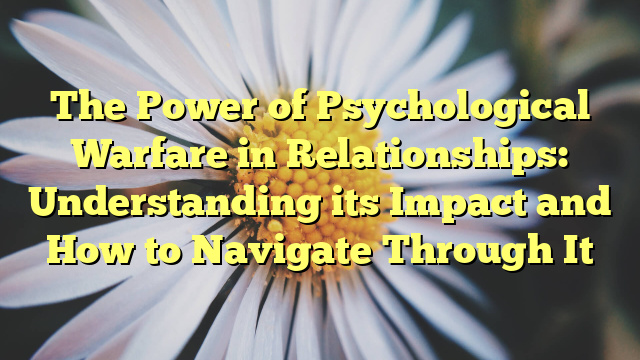The Power of Psychological Warfare in Relationships: Understanding its Impact and How to Navigate Through It
The Power of Psychological Warfare in Relationships: Understanding its Impact and How to Navigate Through It
Introduction
Psychological warfare is a term often associated with military tactics and strategies. However, it is not limited to the battlefield. In fact, psychological warfare can also be present in our everyday lives, particularly in our relationships. Understanding the impact of psychological warfare in relationships is crucial for maintaining healthy and fulfilling connections with our loved ones. In this article, we will explore the power of psychological warfare in relationships and provide strategies for navigating through it.
What is Psychological Warfare?
Psychological warfare refers to the use of psychological tactics and techniques to manipulate, control, or influence the thoughts, emotions, and behaviors of others. It involves the deliberate use of psychological tools to gain an advantage or achieve a desired outcome. In relationships, psychological warfare can manifest in various ways, such as manipulation, gaslighting, guilt-tripping, and emotional abuse.
The Impact of Psychological Warfare in Relationships
The impact of psychological warfare in relationships can be devastating. It erodes trust, undermines self-esteem, and creates a toxic dynamic between partners. The victim of psychological warfare may experience feelings of confusion, self-doubt, and emotional distress. Over time, this can lead to a breakdown in communication, increased conflict, and even the deterioration of the relationship.
Psychological warfare can also have long-lasting effects on the mental and emotional well-being of the victim. It can contribute to the development of anxiety, depression, and other mental health issues. Additionally, it can hinder personal growth and prevent individuals from reaching their full potential.
Navigating Through Psychological Warfare
While psychological warfare can be challenging to navigate, there are strategies that can help individuals protect themselves and their relationships. Here are some tips:
1. Recognize the Signs
The first step in navigating through psychological warfare is to recognize the signs. Pay attention to any patterns of manipulation, gaslighting, or emotional abuse in your relationship. Trust your instincts and listen to your gut feelings. If something feels off or doesn’t align with your values, it may be a sign of psychological warfare.
2. Set Boundaries
Establishing clear boundaries is essential when dealing with psychological warfare. Communicate your needs and expectations to your partner. Be assertive and firm in enforcing your boundaries. Remember that you have the right to be treated with respect and dignity in your relationship.
3. Seek Support
Dealing with psychological warfare can be emotionally draining. Reach out to trusted friends, family members, or professionals for support. Having a support system can provide validation, guidance, and a safe space to express your feelings.
4. Practice Self-Care
Engaging in self-care activities is crucial for maintaining your well-being in the face of psychological warfare. Take time to engage in activities that bring you joy and relaxation. Prioritize your physical, mental, and emotional health.
5. Communicate Effectively
Effective communication is key in navigating through psychological warfare. Express your thoughts, feelings, and concerns to your partner in a calm and assertive manner. Use “I” statements to avoid blaming or accusing. Seek to understand each other’s perspectives and work towards finding mutually beneficial solutions.
The Importance of Seeking Professional Help
If you find yourself unable to navigate through psychological warfare in your relationship, it may be beneficial to seek professional help. A therapist or counselor can provide guidance, support, and tools for addressing the underlying issues and rebuilding a healthy relationship.
Conclusion
Psychological warfare in relationships can have a profound impact on our well-being and the quality of our connections with others. By understanding its power and learning how to navigate through it, we can protect ourselves and foster healthy and fulfilling relationships. Remember to recognize the signs, set boundaries, seek support, practice self-care, and communicate effectively. And if needed, don’t hesitate to seek professional help. Together, we can overcome the challenges of psychological warfare and build stronger, more resilient relationships.

